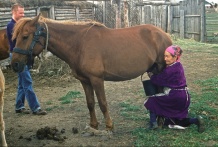
The Origins of Equestrianism and Dairying: Understanding the Legacy of Eurasia’s Early Pastoralists
Professor Alan Outram to give his inaugural lecture on ‘The Origins of Equestrianism and Dairying: Understanding the Legacy of Eurasia’s Early Pastoralists'
Drawing on research concerned with identifying the processes of horse domestication and the origins of pastoral societies in the Steppes of Central Asia, Professor Alan Outram will be giving his inaugural lecture on ‘The Origins of Equestrianism and Dairying: Understanding the Legacy of Eurasia’s Early Pastoralists' on Monday 10 October.
Professor Outram considers, "Imagine a world where the fastest form of land travel was simply by walking, with people only transporting what they could carry or drag. Then imagine the possibilities opened up by riding and harnessing the power of horses. The domestication of the horse had truly revolutionary impacts on human patterns of communication, migration, trade, territoriality and modes of warfare. The horse remained unrivaled until the advent of steam and not widely replaced until the invention of the combustion engine. The use of horses is one examples of a significant series of changes in human/animal relations involving a move away from simply utilizing dead animals for meat and hides towards the use of labour and products from live animals. Another key example relates to the origins of milking and dairying.”
He continues, “By considering the results of many lines of evidence from across Eurasia and more than 15 years of fieldwork in Central Asia, this lecture attempts to understand these two revolutions and the way they may have combined to change the face of prehistoric societies. It deals with the origins of the earliest pastoralist societies and their legacy.”
According to the event listing, Professor Outram’s lecture will show how fieldwork, zooarchaeology, chemical residue analysis and ancient genetics are being used to shed light upon this fascinating sequence of events. He has also been involved in a large project called ‘NeoMilk’, which explores the introduction and spread of cattle-based agriculture by early Neolithic Linearbandkeramik (LBK) farmers and its implications for modelling of the Mesolithic-Neolithic transition in Northern and Central Europe during the 6th millennium BC.
Professor Outram’s inaugural lecture will be taking place on Monday 10 October at 17:30 in LT1, Queens Building. To book a place, please contact humanities-deans-office@exeter.ac.uk or 01392 726315/4231.
Date: 6 October 2016
